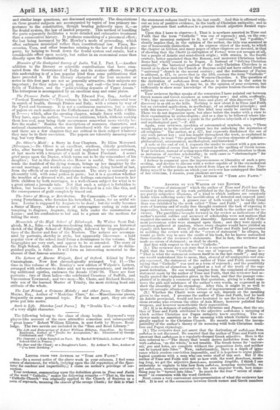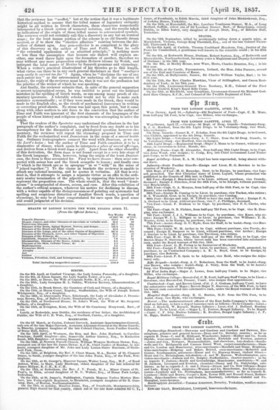ANSWER BY THE 'WRITER OP THE 11,EVIRW,
The "errors of statement" which the author of Time and Faith has discovered in the notice of his work published in the Spectator of January 31, arc purely subjective illusions, of a kind to which authors are commonly liable when suffering under the mortification of detected and exposed ignorance and presumption. A grosser case of both would not be easily found than was exhibited by the work called "Time and Faith"; and the into;. rests of learning and of really free thought rendered the task of exposing it imperative, however unpleasant it might be both to the author and the reviewer. The puerilitice brought forward in the review as indications of the author's mental calibre and accuracy of scholarship were not matters that required discussion to exhibit their absurdity. Ignorance and folly of the most portentous order were stamped upon them ; and they were merely a specimen gathered at random, where every chapter would have yielded an equally rich harvest. Even if the author of Time and Faith had succeeded in saddling the review with all the "errors of statement" he alleges, he would go little way to save the credit of his book: for he leaves untouched three-fourths of the reviewer's statements. But in fact, the reviewer has made no errors of statement; as shall be shown. And first with respect to the ward "Catholic." (1.) The reviewer does not state that it is anywhere asserted in Time and Faith that the term "Catholic" was one of reproach. His phrase Is— "That is what the statement reduces itself to in the lad result '`; and any one would understand this to mean, that, cleared of all ambiguities and simply expressed, the statement of the author of Time and Faith amounts to saying that " Catholic" was used as a term of reproach ; and the possibility of this rcductio ad absurdum is applied as a test of the truth of the supposed derivation. No one would imagine from the complaint of erroneous statement made by the author of Time and Faith, that the reviewer had actually quoted the explanation given in the book, and that the passage complained of is simply a comment upon that quotation, giving in a short sumniary the pith and substance of the author's own words, so expressed as to show the absurdity of his etymology. After this, it might be as well to spare all sarciettic allusions to the virtues of ingenuousness and liberality. (2.) Whether the Chatti were savage or not, depends on the meaning given to the word. I presume the author of Time and Faith, had he been an Asiatic provincial, would not have hesitated to use the term of the ferocious swarms who overran the cities of Asia Minor, however polished their weapons, and however monotheistic their superstition. (3.) It is in defiance of antiquity, both Christian and Pagan, that the author of Time and Faith attributes to the adjective itaeoXiiros a meaning of which neither Christian nor Pagan antiquity knew anything. The reviewer made no assertion as to the meaning with which Catholic was originally applied to the Christian Church. He merely assorted the incompatibility of the author's theory of its meaning with both Christian tradition and Pagan etymology. (4.) The reviewer does not assert that the derivation of itaBoXiuos from uoildoXou is not discussed. He asserted that the author of Time and Faith was ignorant that naBoXixot is a regularly-formed Greek adjective. Here is the note referred to—" The theory that would derive katholikos from the adverb itaeokov, on the whole,' is not tenable. The Greek terms for universal,'flas and halos, are complete without the preposition kata, and neither can be turned into /ans." Now, unfortunately, there is a depth of • ranee which renders conviction impossible, and it is hopeless to argue philological questions with a man who can write stuff of this sort. But if the author of Time and Faith will tell us how with the wont paoiasel, meaning king, we get the adjective PacriXisos, meaning kinglike, I think I can undertake to explain to hint how from natfoXev, meaning universally, we get KaeoXococ, meaning universal—in his own singular words, how something may be " turned into likes." So much for the four " errors of statement" in connexion with the word Cat/Jo/ie.
Next comes a very convenient misrepresentation of what the reviewer has said. It is not at the connexion between Greek names and Greek numbers
that the reviewer has "scoffed," but at the notion that it was a legitimate historical method to assume that the tribal names of legendary antiquity might be all written in Greek characters, these characters numerically interpreted by a Greek system of numeral notation, and the results taken as indications of the origin of those tribal names in astronomical symbols. The reviewer could not certainly call this a discovery loony but an ironical sense; for the least insane portion of the scheme is an old. Gnostic dream revived, as if to show the "elective affinities" existing between the drivellers of distant ages. Any gem-collector is as competent to the glory of this discovery as the author of Time and Faith. What he calls "the extended application of an admitted principle," is nothing more or less than the assumption that because one dialect will explain another, one word throw light upon the formation of another, therefore we may without any more preparation explain Ilebrew idioms by Welsh, and interpret the local names of Mexico by Sanscrit grammar and etymology. When a writer's practical illustrations of his theories go to this length, what virtue can there be in any such general disclaimer as that "analogies -may easily be carried too far"? Again, when he "disclaims the use of any such patent key" as the astronomical for unlocking all the mysteries of history, the reply of the reviewer must be, that it was not the profession but the practice of the writer of which he was speaking.
And finally, the reviewer submits that, in spite of the general suggestion to correct typographical errors, he was entitled to point out the habitual mistakes in the spelling of Greek words, as one among many proofs of elementary ignorance. A tolerable scholar would not be able to make such mistakes systematically ; or if they were made in the Greek, they would be made in the English also, as the result of mechanical inaccuracy in writing or correcting proof-sheets. No stress was laid upon this point, but it came along with other matters to add force to the conviction that the author of Time and Faith was ignorant of the first elements of the languages of the people of whose history and religious systems he was attempting to solve the
That the readers of the Spectator may understand the allusions in the last paragraph of the author's complaint, and be freed from any doubt as to his incompetency for the discussion of any philological question however elementary, the reviewer will repeat the etymology proposed in Time and Faith for the ecclesiastical word Dominican in the sense of a sacred building. Ordinary lexicographers connect the word with Dominus, as we say the Lord's house ; but the author of Time and Faith considers it to be a diminutive of damns, which again he interprets a place of sacred oferinys, and derives from a Greek word daps a gift. .Apart from the other absurdity of this derivation, the form aotLa is not found except in a very late stage of the Greek language. This, however, being the origin of the word Dominican, the form is thus accounted for. First we have donuts : then mini connected with mina, less and the Greek mimytho to lessen ; and finally cum [" which is the Greek vin as in eynagoge" in or "with" in the sense of 'joined together."] To the clause in brackets the reviewer is unable to attach any rational meaning, and he quotes it verbatim. All that is evident is, that it attempts to assign a separate virtue as an affix to the ordinary neuter termination of the adjective, by supposing this termination to represent the preposition cum. The whole result is, that the word " dominicum " is compounded of donuts, minus, and cum. After this exhibition of the author's critical acumen, whatever his motive for declining to discuss, with a writer capable of the disingenuousness of pointing out systematic bad spelling and suspicious distortion of familiar Greek words, a question of etymology, he may be at leant congratulated for once upon the good sense and sound judgment of his decision.



























 Previous page
Previous page